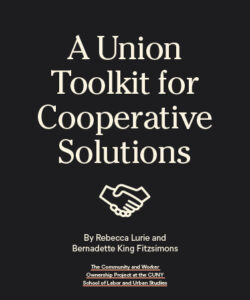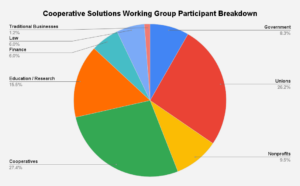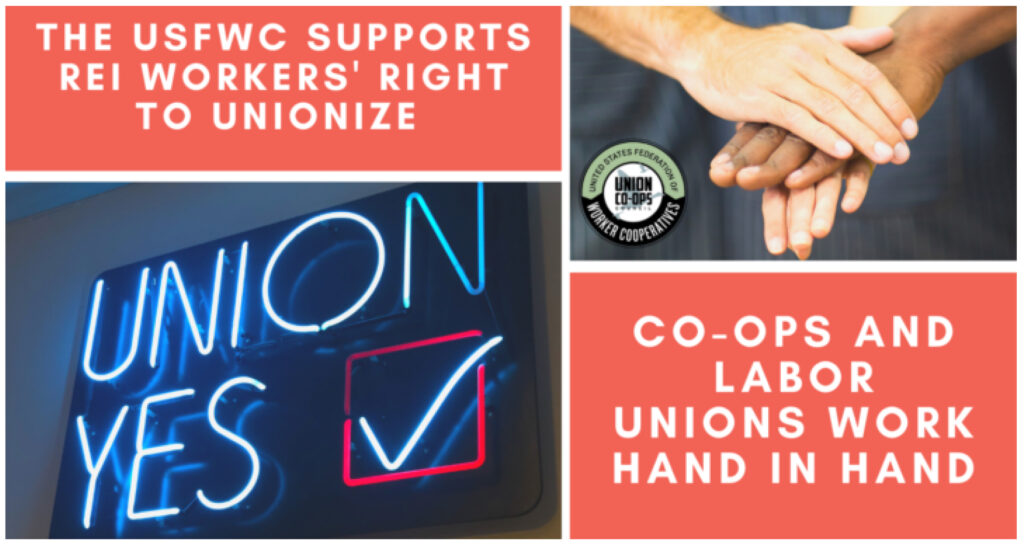A Union Toolkit for Cooperative Solutions 11/2/21
As many readers of this blog know, as COVID-19 took hold in New York City, I was tapped to join the Labor and Workforce Development Sector Advisory Council convened by the City tasked to communicate broadly the day-to-day emergency management of the pandemic and its impacts on working people. This Advisory Council also expressed interest in developing strategies towards economic equity and wealth-building. We understood, it was not only a health crisis, but a racial awakening and a clear exposure of economic inequality. With this in mind, cooperatives and worker-ownership were raised as a strategy with the potential to transform aspects of New York City’s economy.
York City, I was tapped to join the Labor and Workforce Development Sector Advisory Council convened by the City tasked to communicate broadly the day-to-day emergency management of the pandemic and its impacts on working people. This Advisory Council also expressed interest in developing strategies towards economic equity and wealth-building. We understood, it was not only a health crisis, but a racial awakening and a clear exposure of economic inequality. With this in mind, cooperatives and worker-ownership were raised as a strategy with the potential to transform aspects of New York City’s economy.
Our Council was made up of leaders from organized labor, workforce development organizations, nonprofits, and academic institutions. CWOP took the energy of the moment and with the sign-on of eighteen participants of this Council established the year-long the Cooperatives Solutions Working Group. CWOP had previously convened several groupings of labor and workforce professionals. Working with the NYC Network of Worker Cooperatives and Union Co-ops Council of the US Federation of Worker Coops, we facilitated workshops and presentations on unions and co-ops. In February of 2020, in partnership with the Consortium for Worker Education, we hosted a visit with representatives from Mondragon, Spain, to discuss with labor and workforce development leaders how cooperative ecosystem building could help our local economy. Hearing how this strategy was applied in the Basque Region over 50 years ago and how Mondragon coops work today, interest was piqued. But this was only days before our city’s shut down.
The Cooperative Solutions Working Group met monthly, providing an open space for learning, discussion, and rich dialogue. Over the year, we built a dynamic environment for those interested in NYC’s equitable economic recovery to discuss themes of worker power, worker ownership, and collaboration for a just economy. We drew a wide assembly of labor leaders, organizers, cooperative developers, cooperative members, labor lawyers, City officials, and more to share their stories honestly, bringing forward lived experiences and challenges faced. [see Figure 1]. More than 200 people attended the (twelve) monthly meetings, with over 60 being regular attendees. Many sessions were reported on in this Blog.
F igure 1. Cooperative Solutions Working Group Participant Characteristics
igure 1. Cooperative Solutions Working Group Participant Characteristics
“The Cooperative Solutions Working Group was exactly what I needed ~ thoughtful, connected and soul-nourishing conversation. I am grateful to Rebecca for having the vision to not stop the work after the Mayor’s Advisory Council, and instead, put this opportunity in front of us in this open and expansive way. I am also grateful for all the folks who join the sessions. I believe we are creating pathways to a more equitable, just and collaborative tomorrow and beyond.”
- Adria Powell, President and CEO of Cooperative Home Care Associates (CHCA), the largest union co-op in the nation, operating from the South Bronx, NYC.
As this phase of the working group came to a close in the summer of 2021, we committed to share key lessons on ways labor unions are interacting with cooperative businesses to expand worker power through ownership and democratic governance. As we listened, we saw that there are consistent ways and means that unions were collaborating with economic changes and the development of cooperative economies. This paper documents some of the lessons learned through case studies we heard in our Working Group, and offers a toolkit for those interested in broadening strategies for owning and controlling places of work. Our theory of change is to share stories from others and then replicate what works, what can be done elsewhere and to welcome an attitude of “more of that!” In this way we aim to expand the power and influence of the union movement towards the cooperative ecosystem of our next economy.
Tools we identify are:
- openness to innovative organizing
- investment of union staff and professional expertise
- use of union spaces
- training funds and educational expertise
- capital access and relationships with financial institutions.
- negotiation process and a collective bargaining agreement
- sectoral analysis and legislative organizing
Our case studies feature:
- Cooperative Home Care Associates / 1199SEIU United Healthcare Workers East
- Lobster 207 / IAM District 4
- New Era Windows / UE Local 1110 / The Working World
- People’s Choice Communications Cooperative
- Homeland / UFCW Local 1000
- LVN Cooperative / AlliedUP Cooperative / SEIU United Healthcare Workers West
- Coop Cincy / Coop Dayton and multiple unions in their ecosystem
Read the full report here:
A Union Toolkit for Cooperative Solutions 11/2/21








